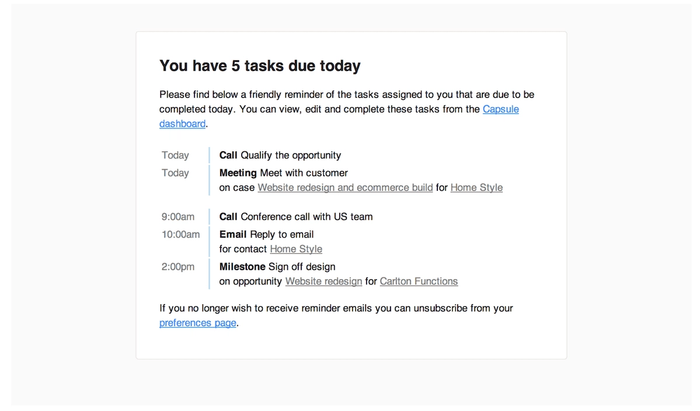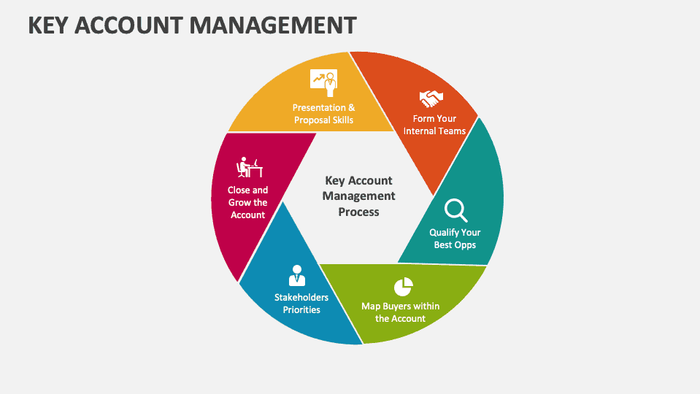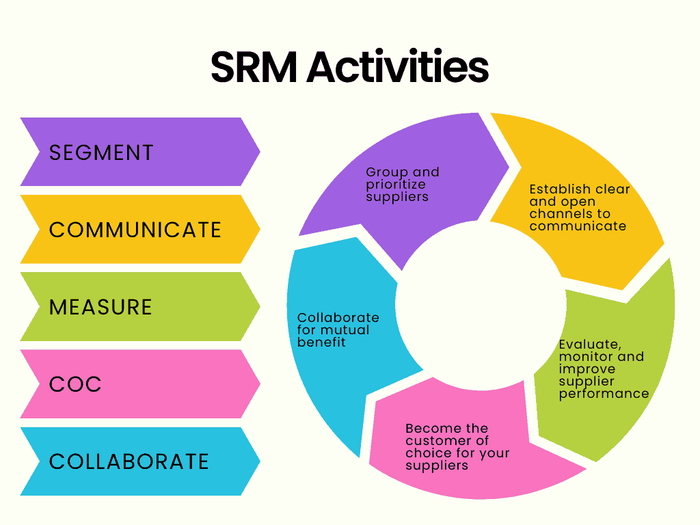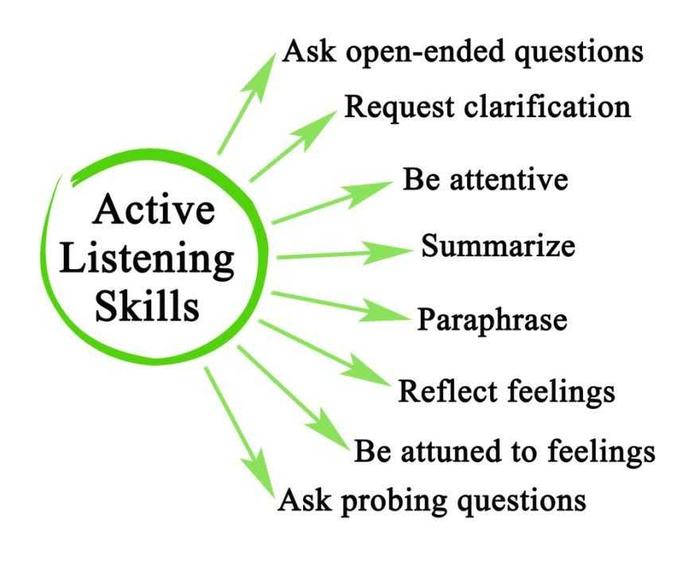a diagram lists different ways to demonstrate active listeningSales is all about building connections. To be good at selling, your business needs to foster a positive and productive relationship with its customers. The average sales process is rarely straightforward, meaning prospects have to travel through the sales funnel before making a purchase.
One of the best tools in your business arsenal is relationship management. Today, we'll show you what it is and how it works, and how you can implement it in your own business.
Relationship management definition
In sales, relationship management is the process of building, maintaining, and enhancing interactions with customers, clients, and other stakeholders. The ultimate goal of customer relationship management is to drive more sales and foster long-term brand loyalty.
To be successful, relationship managers need the following skills:t:
- Customer understanding - the relationship manager knows the customer's needs, preferences, pain points, purchasing behaviors, and more, based on data and sales analysis;
- Effective communication - relationship managers communicate with customers to provide information about their product, collect feedback, and maintain a post-sales support program;
- Personalization - relationship building is all about tailoring the communication with the customer so it meets their individual needs and interests, ensuring you maintain good relationships with customers and boost the company's reputation;
- Building trust - managing client relationships requires showing reliability, integrity, and expertise instead of using marketing buzzwords and tactics;
- Providing value - relationship management aims to help the customer by giving honest recommendations and trying to solve a problem instead of selling at all costs;
- Giving post-sale support - generous post-sales involvement helps your company identify potential problems that happen once the money changes hands and improves brand loyalty;
- Building relationships with customers - long-term connections between your business and other businesses make sure that the customer not only stays but becomes a brand champion who recommends you and refers new business partners;
- Feedback and relationship evaluation - a relationship manager should oversee relationship building and collect feedback every step of the way, storing it in your chosen customer relationship management software.

Types of relationship management in sales
You need to use different types of relationship management depending on what you sell and whom you sell it to. Between customers, business partners, and key accounts, there are many different processes and tools you can use to maintain great relationships.
Customer relationship management (CRM)
Customer relationship management software is used to manage all interactions with potential and current customers, as well as manage their contact data. A good CRM helps with maintaining communication, managing pipelines, tracking sales progress, and developing campaigns for both marketing and sales.
A functional CRM software such as Capsule speeds up your business processes, tracks customer interactions, and gets more sales through the door.
Here are some of the many features offered in Capsule CRM:
- Contact management: a bird's eye view of your prospects along with their most important data;
- Sales pipeline: sales teams get an overview of ongoing deals and the stage they are in;
- Workflow automation: you can automate tedious tasks such as cold outreach and follow-ups;
- Email marketing and tools: to send out outbound email campaigns through Outlook and Gmail via integrations instead of creating email content manually;
- Sales analytics: get an overview of your sales processes, closed and won opportunities and more;
- AI content assistant: helps you write emails quickly so you have more time to focus on the actual sales;
- Tasks and calendar: to manage your sales teams' activity, assign them tasks within the CRM and monitor their progress;
- Projects: an actual project management tool within the CRM software, allowing your sales reps to organize their entire operations within one tool.

Account management
Account management is the process of maintaining a good relationship with a specific account. For example, if you're a design agency, relationship management entails regular communication with the client and ensuring you meet their needs at all times.
Key account management
Say that you have that design agency and you have a set of clients who are particularly important. They bring a lot of revenue every month and they've been with you for a long period of time. This is key account management (KAM) and this type of relationship management is all about strengthening the relationships with your most valuable customers.

-- Image source
Partner relationship management
In business-to-business operations (B2B), partner relationship management means maintaining communication with suppliers, vendors, resellers, contractors, and other organizations that help you deliver high-quality work.
Relationship management involves strategies for dealing with partners too because they can often make or break your success with your customers. One key benefit of this process is that you can guarantee each step of the process, including those that are not in your hands.
Supplier relationship management (SRM)
Suppliers help you provide materials for completing work for your end clients. Supplier relationship management or SRM includes contract negotiations, maintaining quality and reliability, as well as building long-term relationships.

-- Image source
In a changing economic landscape, choosing the wrong kind of supplier can not only hurt your bottom line but also ruin the relationships with your existing and potential customers.
Channel management for a positive and productive relationship
This part of relationship management is about managing relationships with different distribution channels like direct sales, e-commerce, retail, and wholesalers. It ensures that the clients yield rewards from your cooperation.
Strategic relationship management
Is relationship management important to your business? Then you need strategic relationships with other companies in the same or adjacent industries. The relationship manager ensures through collaboration, both businesses achieve better results for their end customers.
Internal relationship management
To crush your business goals, your organization must maintain an ongoing relationship with internal stakeholders. This means aligning your sales, marketing, and product teams, customer support, and others to improve the customer lifetime value and increase revenue even further.
Leveraging technology for smarter relationship management
Every missed interaction is a missed opportunity. The hardest part of managing relationships is staying consistent. With the right tools, you can keep every interaction meaningful and avoid things getting lost in the shuffle:
- Automate the boring stuff: Forget about chasing emails or manually logging customer data. With CRM software, your sales team can automate many small tasks that otherwise would take ages. For example, if a sales rep spends just 10 minutes per lead on manual updates and manages 30 leads a day, that’s five hours gone. Automation gives this time back.
- Turn data into insights: The right CRM system gives you a clear view of your customer relationships. Sales professionals can identify patterns in customer behavior – like the last product purchased or how often a client engages. For instance, if your relationship manager notices a prospect frequently clicks on a specific service, they can tailor the next sales pitch to fit that need.
- Bring it all together: Forget hopping between platforms. When your CRM connects directly to email, analytics, and project management tools, everything stays in sync. With the right tools, your team can handle the admin in minutes and dedicate more time to creating genuine connections.
Top tips for relationship management in sales
You shouldn’t view the relationship as merely transactional in sales. When done right, business relationship management can increase brand loyalty, build client support, and develop positive relationships for the years to come. Here are some tips to help you get there.
Be an active listener
The relationship management definition involves paying attention to what your customers are saying. It seems like a logical thing to do, but for many businesses, actively listening and collecting feedback is an afterthought that often doesn’t matter as long as money is rolling in.

-- Image source
Your management should create an environment where customers feel their voice is heard. You should listen for and anticipate their needs, concerns, preferences, objections about your services and pricing, and more.
The more significant the account or client, the more important it is to actively listen to them regularly.
Communicate clearly
Avoid marketing techniques that describe your product in a way that is too technical or unclear. Instead of saying you "provide disruptions in the high-velocity worlds of B2B tech sales", explain that you "offer sales services to B2B companies".
Being truthful is one of the key elements of sales, so try not to oversell your product with buzzwords.
Be responsive
The average customer gets a response to their query in about 12 hours, according to customer data from different industries. That may sound fast, but in reality, customers expect their response time to be under four hours.
Managing business relationships well means responding to customer queries quickly and ideally resolving their problems after the customer’s first contact.
Some ways you can achieve this include business phone systems with IVR and smart routing, chatbots and live chat on your website, omnichannel contact centers that manage all customer interactions, good CRM integrations, and others.
Build trust
Beyond accurately describing what you sell, each customer interaction is another opportunity to build rapport and trust. Avoid making promises your service can’t keep.
Manage expectations by being transparent about what you can and cannot do for your customers, and be realistic about what they can expect from your team.
If you see potential issues arising, address them ahead of time and inspire confidence in potential customers that their time and money are in safe hands.
Provide value
Client relationship management is more than just providing a service and collecting money for it. You should aim to provide value every step of the way to show the client that you are interested in long-term collaboration.
For example, you could offer:
- Free product demos and walkthroughs
- Personalized onboarding
- 1:1 training sessions
- Post-purchase follow-up
The customer should feel like you are trying to help them in the best way possible, even if it means selling a product that costs less or not selling to them at all.
When customers feel like you have their best interest in mind they’re more likely to give you their business.
Follow up regularly
Just because someone has completed a purchase doesn't mean your interactions with them should end. On the contrary, post-purchase follow-up is the best way to increase brand loyalty and customer lifetime value (CLV), as well as get new referrals from existing customers.
A good customer relationship management (CRM) tool offers automation to remind you to follow up with customers after set periods of time. If your customer success teams are busy, your automation will prompt them when it's time to reach out to the customer to offer help and guidance.
Personalize your interactions
You likely have a variety of customers, who operate in various industries and regions and may be paying for different services. So, communications like emails, in-app messages, calls, and reminders should vary to match your customer segments.
Your client relationship management tool can be of massive help here, as it can segment your customers based on company location, deal size, last touchpoint, and more.
Using a CRM alongside an email marketing tool lets you personalize each outreach message accurately. For example, you can use the customer's name in the introduction, some details about their industry in the body, and a different unique selling point in your emails.
Be empathetic
Your industry is likely filled with competing businesses looking to beat you to a sale at all costs. The way to stand out is to put yourself in the customers' shoes and think of ways you can solve their pain points.
Instead of looking at customers as sources of cash, think about them as people you want to help. Happy customers are customers who pay well and stay with you.
Unfortunately, there are no shortcuts here. But a great way to keep your customers happy is to hire and train great people for customer support
Stay organized
With hundreds and thousands of potential and existing customers, juggling your to-do list alongside customer communications becomes overwhelming. Just think of all your prospecting, emails, calls, and contract renewals: managing it all manually feels impossible.
A CRM like Capsule ensures that all your customer information is kept central. For each contact, you'll find their key details, previous interactions, complaints, post-sale survey results, and more kept in one place. And with the help of Capsule’s integrations, you can set up your CRM system to send automated follow-ups to customers.
For example, if someone has been a customer for over a month, an automation can be set up to send a message asking if the customer is satisfied and what can be done to help them even more.
Seek feedback
You may think you’re building a solid rapport and helping out a current customer to the best of your capabilities, but the reality could be anything but. Instead of making assumptions, keep an ongoing level of engagement by asking your customers outright if they are happy with your services and products, as well as customer support.
Some of the ways you can ask for feedback include:
- Personalized scheduled emails
- Customer satisfaction surveys
- Social media polls and questionnaires
- In-app surveys and feedback forms
Summary
Customer relationship management isn't just nice to have - it's an essential part of your sales strategy. It helps you create and maintain better relationships with your business partners, gauge consumers' interests, maintain loyalty among your customers, and increase your bottom line.
All you need is a reliable client relationship management tool to get started. Capsule enables business owners, sales and marketing, and customer support teams to build customer loyalty, centralize and manage customer data, and foster stronger customer relationships – all in one easy-to-use CRM.
Sign up to Capsule completely free CRM package or start a two week free trial of any Capsule CRM plan today.




